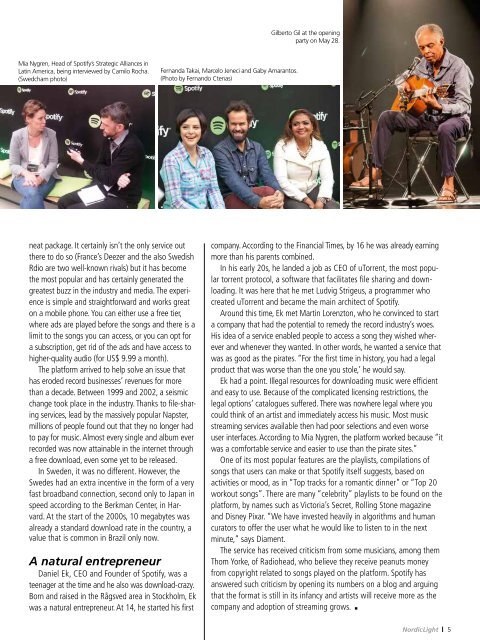Nordic-Light-Jun2014-Aug2014
Nordic-Light-Jun2014-Aug2014
Nordic-Light-Jun2014-Aug2014
You also want an ePaper? Increase the reach of your titles
YUMPU automatically turns print PDFs into web optimized ePapers that Google loves.
Gilberto Gil at the opening<br />
party on May 28.<br />
Mia Nygren, Head of Spotify’s Strategic Alliances in<br />
Latin America, being interviewed by Camilo Rocha.<br />
(Swedcham photo)<br />
Fernanda Takai, Marcelo Jeneci and Gaby Amarantos.<br />
(Photo by Fernando Ctenas)<br />
neat package. It certainly isn’t the only service out<br />
there to do so (France’s Deezer and the also Swedish<br />
Rdio are two well-known rivals) but it has become<br />
the most popular and has certainly generated the<br />
greatest buzz in the industry and media. The experience<br />
is simple and straightforward and works great<br />
on a mobile phone. You can either use a free tier,<br />
where ads are played before the songs and there is a<br />
limit to the songs you can access, or you can opt for<br />
a subscription, get rid of the ads and have access to<br />
higher-quality audio (for US$ 9.99 a month).<br />
The platform arrived to help solve an issue that<br />
has eroded record businesses’ revenues for more<br />
than a decade. Between 1999 and 2002, a seismic<br />
change took place in the industry. Thanks to file-sharing<br />
services, lead by the massively popular Napster,<br />
millions of people found out that they no longer had<br />
to pay for music. Almost every single and album ever<br />
recorded was now attainable in the internet through<br />
a free download, even some yet to be released.<br />
In Sweden, it was no different. However, the<br />
Swedes had an extra incentive in the form of a very<br />
fast broadband connection, second only to Japan in<br />
speed according to the Berkman Center, in Harvard.<br />
At the start of the 2000s, 10 megabytes was<br />
already a standard download rate in the country, a<br />
value that is common in Brazil only now.<br />
A natural entrepreneur<br />
Daniel Ek, CEO and Founder of Spotify, was a<br />
teenager at the time and he also was download-crazy.<br />
Born and raised in the Rågsved area in Stockholm, Ek<br />
was a natural entrepreneur. At 14, he started his first<br />
company. According to the Financial Times, by 16 he was already earning<br />
more than his parents combined.<br />
In his early 20s, he landed a job as CEO of uTorrent, the most popular<br />
torrent protocol, a software that facilitates file sharing and downloading.<br />
It was here that he met Ludvig Strigeus, a programmer who<br />
created uTorrent and became the main architect of Spotify.<br />
Around this time, Ek met Martin Lorenzton, who he convinced to start<br />
a company that had the potential to remedy the record industry’s woes.<br />
His idea of a service enabled people to access a song they wished wherever<br />
and whenever they wanted. In other words, he wanted a service that<br />
was as good as the pirates. “For the first time in history, you had a legal<br />
product that was worse than the one you stole,’ he would say.<br />
Ek had a point. Illegal resources for downloading music were efficient<br />
and easy to use. Because of the complicated licensing restrictions, the<br />
legal options’ catalogues suffered. There was nowhere legal where you<br />
could think of an artist and immediately access his music. Most music<br />
streaming services available then had poor selections and even worse<br />
user interfaces. According to Mia Nygren, the platform worked because “it<br />
was a comfortable service and easier to use than the pirate sites.”<br />
One of its most popular features are the playlists, compilations of<br />
songs that users can make or that Spotify itself suggests, based on<br />
activities or mood, as in “Top tracks for a romantic dinner” or “Top 20<br />
workout songs”. There are many “celebrity” playlists to be found on the<br />
platform, by names such as Victoria’s Secret, Rolling Stone magazine<br />
and Disney Pixar. “We have invested heavily in algorithms and human<br />
curators to offer the user what he would like to listen to in the next<br />
minute,” says Diament.<br />
The service has received criticism from some musicians, among them<br />
Thom Yorke, of Radiohead, who believe they receive peanuts money<br />
from copyright related to songs played on the platform. Spotify has<br />
answered such criticism by opening its numbers on a blog and arguing<br />
that the format is still in its infancy and artists will receive more as the<br />
company and adoption of streaming grows.<br />
<strong>Nordic</strong> <strong>Light</strong> 5


